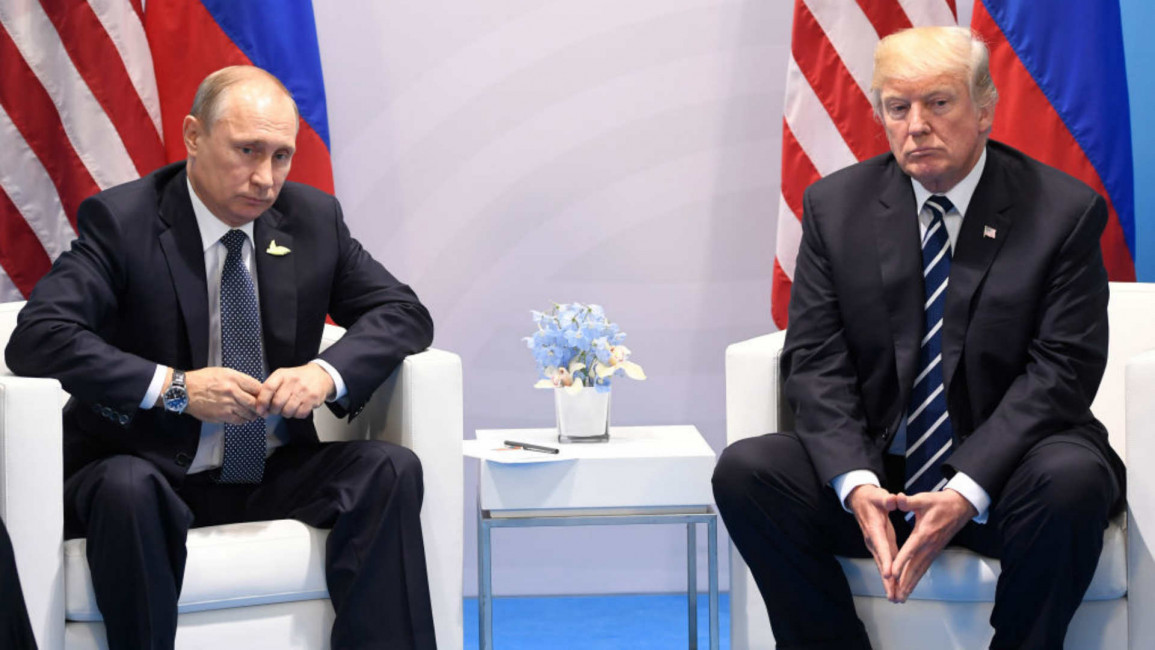
Even under Trump, warmer relations with Russia are impossible
Memories of the Cold War itself are not quite forgotten. In the current war of words between Russia and the United States, the world of diplomacy and its supplements resemble a tit-for-tat conflict.
Last week, the Russian state in effect threatened to expel 755 staff affiliated with the American embassy by impelling the Americans to reduce their presence within the country.
It must be noted first that there are not that number of US diplomats in Russia. This number would therefore include dismissing non-diplomatic staff, creating all sorts of problems for the Americans. Many of those workers will be Russians themselves.
A Cold War theme is not unwarranted. The stated number could include Americans engaged in less than diplomatic tasks. It even could be about spying, as the Russian authorities seem to want to imply. American spy networks operating in Russia, like Russian spy networks in America, are connected to the established, overt diplomatic network. This is hardly a surprise. There is no need for state actors engaged in the same to seem shocked.
 |
Normal, amicable diplomatic relations with Russia are both impossible and undesirable while Putin remains in power |  |
When, in December, the Americans recently seized two Russian state-owned properties in the US, they did so on the pretext that they were being used for spying. In a parallel action, on Friday the Russian state took possession of two US properties in Russia.
Admittedly, and perhaps ironically, these had more innocuous uses. The New York Times says one was a warehouse and the other was used for barbeques – hardly the stuff of real espionage. They're not exactly safehouses for American agents.
This specific diplomatic dispute could be seen as retaliation for recent US expulsions of Russian personnel in America. Barack Obama expelled Russians nominally associated with the country's diplomatic effort last December.
| Read more: Trump says he could pardon himself as Russia probe intensifies | |
Unlike Obama, whose foreign policy was perceived by to be negatively disposed towards Russia, his successor Donald Trump has loudly proclaimed his wish to take a different tack. He has personally expressed great fondness and admiration for Vladimir Putin.
 |
Donald Trump has loudly proclaimed his wish to take a different tack |  |
Putin, Trump said, is a great man. He is strong. He knows what he wants. He pursues the Russian national interest with determination. Unlike American leaders of various stripes, Putin was the model Trump looked to and seemed to want to imitate.
Trump lamented the sour relations between their two countries. He did so simply. Why, he asked, can't we get along? This is remarkably naive, but it seemed to work. It fitted with a perception of Hillary Clinton as a hawk committed to the foreign policy thinking of the American establishment. Why not, Trump asked, buddy up with a dictator like Putin?
Many times during the 2016 presidential election campaign, Trump talked of how Russia and the US could get along. He promised relations would improve when he took office.
But this has not happened, despite Trump's intentions and efforts. Russian actions, particularly in Syria and Ukraine, continue to frustrate the Americans.
This story demonstrates that America, even under President Trump, cannot have a good relationship with Putin's Russia.
 |
Putin, Trump said, is a great man. He is strong. He knows what he wants. He pursues the Russian national interest with determination |  |
The stated reason for the Russian edict on US diplomatic staff was the passage of bipartisan legislation sanctioning Russia for its intervention in the 2016 presidential elections, as well as Congressional hearings about Russian aggression in Ukraine.
The Russian connection to Trump himself is under investigation. This connection unlikely to be as flagrant or direct as many expect, and in some cases hope. Many people who sided with Obama's continual deprecation of stories of Russian-American antagonism now see there's much to be gained by changing tack.
Russia, sometimes just the word itself, has become a magic thing in America, now Trump can be hit over the head with it.
| Read more: Trump is not the problem, America is | |
As well as noting this cynical media trend, observers cannot but conclude Russian intervention in American democratic processes is a real problem.
The same can be said of Russian aggression against Ukraine and Syria. An American ally, in the form of Ukraine, has been invaded, and the Syrian people suffer for Russian actions. Russian planes have caused vast number of civilian casualties. They participated in the regime recapturing of Aleppo, and the unrelenting, cultivated brutality of that campaign. Russian planes have facilitated regime war crimes and the bombing of an aid convoy.
This cannot be allowed to stand, as Trump has no doubt been told by his advisors.
While this goes on, no matter the favourable posture of the White House, American politicians cannot be expected to stand by idly. They cannot watch as an ally of America is invaded by Russian-backed troops and has its territory illegally seized, as has happened to Crimea.
 |
Aggressiveness in all things is key to how Putin sees the world |  |
As Anne Appelbaum has suggested, aggressiveness in all things is key to how Putin sees the world. The Russian state has institutionalised this "Putinism". It is essential to its president's view of Russian power.
Where some look at Russia and see a power in decline, with an economy the size of Spain and a population smaller than that of Bangladesh, Putin and his fellow thinkers see a world power, whose dominance can be sustained and extended through aggression.
This is manifested in the Russian interventions in Georgia, Ukraine and Syria. It's manifested in the way Russia has effectively taken over parts of the Syrian coast, and in Ukraine, parts of which have become Russian dependencies.
Normal, amicable diplomatic relations with Russia are both impossible and undesirable while Putin remains in power and his style of government remains in operation. Under Putin, the Russian state has institutionalised an aggressiveness which will not yield to blandishments.
Trump will find that foreign policy realities cannot live up to campaign rhetoric. The two countries cannot make nice. This will not blow over and the relationship cannot be reconciled. And in the meantime, this diplomatic war by other means will continue.
James Snell is a writer and blogger whose work has appeared in National Review, Prospect, CapX, NOW News, Middle East Eye, History Today and Left Foot Forward - among others.
Follow him on Twitter: @James_P_Snell
Opinions expressed in this article remain those of the author and do not necessarily represent those of The New Arab, its editorial board or staff.




